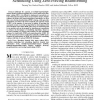92 search results - page 4 / 19 » Scheduling of Multi-Antenna Broadcast Systems with Heterogen... |
102
Voted
TCOM
2010
14 years 10 months ago
2010
—This paper analyzes the quality of service (QoS) of scheduling algorithms for heterogeneous users in multiuser (MU) wireless systems that take advantage from a crosslayer design...
101
click to vote
GLOBECOM
2008
IEEE
15 years 24 days ago
2008
IEEE
Abstract—This paper investigates the zero-forcing (ZF) beamforming transmit strategy in the multiple-antenna multiuser downlink systems. We consider the case of mobile users equi...
JSAC
2006
14 years 11 months ago
2006
Abstract--Although the capacity of multiple-input/multipleoutput (MIMO) broadcast channels (BCs) can be achieved by dirty paper coding (DPC), it is difficult to implement in practi...
97
Voted
CORR
2006
Springer
14 years 11 months ago
2006
Springer
Broadcasting is known to be an efficient means of disseminating data in wireless communication environments (such as Satellite, mobile phone networks,...). It has been recently ob...
JSAC
2006
14 years 11 months ago
2006
For fading broadcast channels (BC), a throughput optimal scheduling policy called queue proportional scheduling (QPS) is presented via geometric programming (GP). QPS finds a data ...

